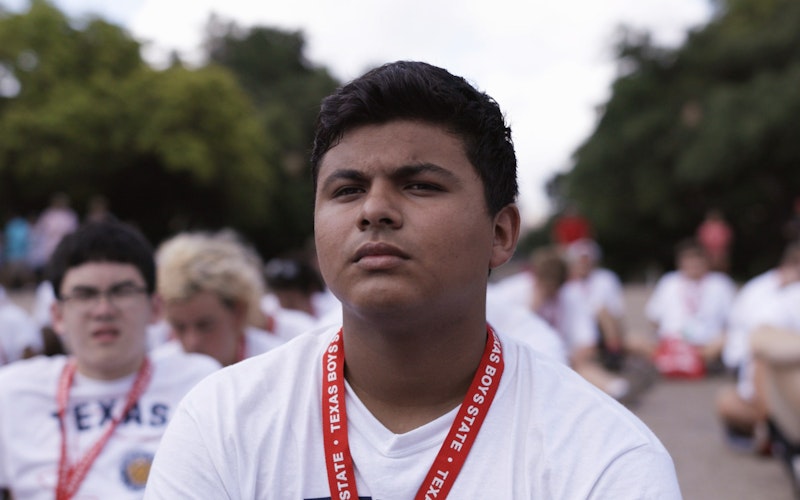
Movies
Boys State and Prophetic Politics
Pride is like breathing for a Texan. It’s inherited, mechanical, unquestioned. I know it well. Though I haven’t lived in Texas for years, there’s still something attractive about this pride, and I’m tempted to claim it for its comfortable illusion of superiority. But in the years since I’ve moved away, I’ve unlearned that deterministic pride in birthplace identity. I’ve found hope elsewhere, beyond the borders we’re born into.
Pride also drives many of the subjects of Boys State, Jesse Moss and Amanda McBaine’s electric new documentary, available on Apple TV Plus. As part of a summer program sponsored by The American Legion, these boys have traveled to Austin from across Texas to spend a week forming their own government. Despite their lofty goals, they are still teenagers, with all their unfettered energy and swagger. They take pride in their cities, their talents, their success, and their masculinity. They campaign; they start spontaneous push-up contests. Over the week, they will participate in a crash course of the highs and lows of politics. Boys State invites us along for the experience, providing a distillation of our actual political system, one that is occasionally hopeful, often frustrating, and consistently insightful. Through it all, we’re left with a longing for something better.
When the boys arrive, they are randomly assigned a party: Federalists or Nationalists. Long before their parties even have platforms, they are cast into a contest, passionate in their sense of rightness over and above their competitors. Their allegiances are determined for them, but they don’t even know what they’re giving their fealty to.
But that’s not surprising—it’s our common experience. We inherit allegiances defined by country and culture, born under a political system with all its virtues and flaws. And we can enthusiastically buy into these inheritances, setting the boundaries of our hope according to the limits of what each system can offer. But over time, all of these systems begin to show their cracks. We long for renewal, but we’re constantly frustrated by how far short our systems fall in accomplishing lasting transformation. We’re left looking for something more, something of true substance. Boys State inhabits this space between hope and the limitations of our efforts.
The boys jump right into creating their parties’ structures. They elect party chairs, representatives, and gubernatorial candidates. The ones who seek office run on party unity, platform, or popularity. At times, the boys are subjected to—or perpetrate—the worst vices of the system. Lies, slander, offensive memes, and betrayal are all defensible tactics if they achieve victory. During one exchange, an aspiring politico celebrates the success of “shock and awe” tactics; in fact, many of the teens approach their political duties with the mindset of warfare. In these moments, Boys State serves as a lament of the ingrained sins of our politics—or perhaps a lampoon, since these underhanded tactics are all carried out by teenagers trying to win a fake election.
But just as some moments evoke satire, others offer a parable of hope. The young men have real moments of humility, of listening to those who disagree with them, and of finding unlikely unity. After losing an election built on bravado, one of the teens reflects that maybe people didn’t want shouted rhetoric, that “on the inside, they wanted something serious.” Casting rhetoric aside, we can accomplish something serious in our political system; reform and renewal are possible. However, our hope in government can only go so far. For every need met and problem solved, there remains a world of brokenness. And we yearn.
Over time, all of our political systems begin to show their cracks.
Israel’s prophets yearned for something better, too. In their words we find both a call to renewal and an honesty about the limits of human systems. Micah instructed Judah to turn from their sin and “to act justly, love mercy, and walk humbly with your God.” Yet his ultimate hope was in the future kingdom of God, when “many nations will come, and say, ‘Come, let us go up to the mountain of the Lord.’” Even at their best, our systems are fractured by injustice and sin. In contrast to the warring and antagonism that fills our politics, both Micah and Isaiah point us to a time when people “will beat their swords into plowshares and their spears into pruning hooks. Nation will not take up sword against nation, nor will they train for war anymore.”
The prophets direct us to lament the brokenness of this world and to seek restoration and reconciliation, but they also call us to a hope far beyond earthly systems and kingdoms. In the midst of one of the mightiest empires in history, Daniel recorded the king of Babylon praising God in awe: “His kingdom is an eternal kingdom; his dominion endures from generation to generation.” Even as we seek to do justice and love mercy in our present age, this eternal kingdom stirs our longing, because it is a kingdom without war, oppression, injustice, or suffering. We live with our hope fastened on this place of peace, righteousness, and unity with God.
Some moments of Boys State feel like a farce; some like a fable. But both farce and fable make us hungry for something else: a better and truer world. Boys State follows in the tradition of the prophets, calling us to work for transformation in the here and now, while making us painfully aware of the limitations of our man-made systems. In God’s kingdom, we no longer need to build pride in party or politician or place of birth. And while we strive to bring about mercy and justice, we ultimately look toward the promise of Isaiah: “On this mountain he will destroy the shroud that enfolds all peoples, the sheet that covers all nations. . . In that day they will say, ‘Surely this is our God; we trusted in him, and he saved us.’”
Topics: Movies